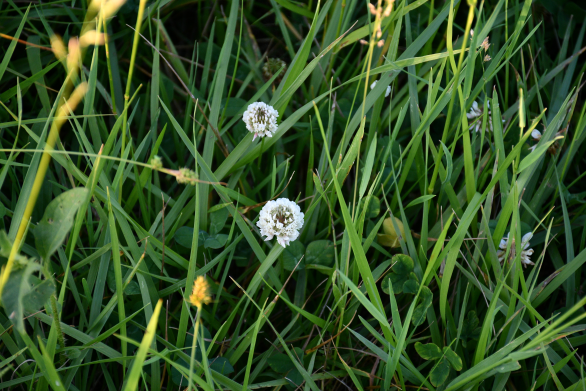 Clover in a grass hay stand is not always a problem, as many growers value it for nitrogen fixation, protein content, and forage quality. However, when clover begins to dominate, it can reduce grass stand longevity, shorten productivity, and create concerns for livestock, such as bloat in cattle.
Clover in a grass hay stand is not always a problem, as many growers value it for nitrogen fixation, protein content, and forage quality. However, when clover begins to dominate, it can reduce grass stand longevity, shorten productivity, and create concerns for livestock, such as bloat in cattle.
If you plan to overseed grasses, it’s important to manage the clover first. Simply adding more seed without reducing the clover will likely fail, since clover competes aggressively for light, soil moisture, and nutrients.
The best time to control clover is during its vegetative stage before flowering and seed set. Once clover blooms, it can reseed aggressively, making control much harder. At the vegetative stage, clover is actively growing and most responsive to management. Options such as grazing, mowing, or herbicide application are most effective before bloom. Cutting or grazing early also reduces competition and improves conditions for successful grass overseeding.
- Spring or early summer control: Manage clover before bloom to give grasses a better chance to compete.
- Fall control: After the last cutting or grazing, before dormancy, can also be effective and set up grasses for stronger establishment the following season.
Research shows that managing competition well ahead of seeding with methods like mowing, grazing, or carefully timed herbicide applications gives new grass the best chance to establish in the stand. Once clover growth is checked, overseeding grasses will stand a much better chance of survival and long-term stand longevity, helping you maintain a balanced and productive hay field.
References
- Fery, M., Ghajar, S. M., & Smith, E. (2024, August). Revitalizing your pastures: A primer for overseeding pastures in Western Oregon. Oregon State University Extension Service.
- Lingenfelter, D. (2024, August). Fall weed control in forages. Penn State Extension.
- Fike, J., & Flessner, M. (2024, October). No-till seeding of forage grasses and legumes (SPES-92P). Virginia Tech School of Plant and Environmental Sciences.


